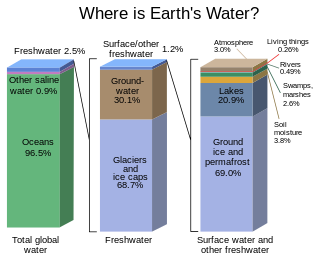Most water in Earth's atmosphere and crust comes from saline seawater, while fresh water accounts for nearly 1% of the total. The vast bulk of the water on Earth is saline or salt water, with an average salinity of 35‰ (or 3.5%, roughly equivalent to 34 grams of salts in 1 kg of seawater), though this varies slightly according to the amount of runoff received from surrounding land. In all, water from oceans and marginal seas, saline groundwater and water from saline closed lakes amount to over 97% of the water on Earth, though no closed lake stores a globally significant amount of water. Saline groundwater is seldom considered except when evaluating water quality in arid regions.
The remainder of Earth's water constitutes the planet's freshwater resource. Typically, fresh water is defined as water with a salinity of less than 1% that of the oceans – i.e. below around 0.35‰. Water with a salinity between this level and 1‰ is typically referred to as marginal water because it is marginal for many uses by humans and animals. The ratio of salt water to fresh water on Earth is around 50:1.
The planet's fresh water is also very unevenly distributed. Although in warm periods such as the Mesozoic and Paleogene when there were no glaciers anywhere on the planet all fresh water was found in rivers and streams, today most fresh water exists in the form of ice, snow, groundwater and soil moisture, with only 0.3% in liquid form on the surface. Of the liquid surface fresh water, 87% is contained in lakes, 11% in swamps, and only 2% in rivers. Small quantities of water also exist in the atmosphere and in living beings.
Although the total volume of groundwater is known to be much greater than that of river runoff, a large proportion of this groundwater is saline and should therefore be classified with the saline water above. There is also a lot of fossil groundwater in arid regions that have never been renewed for thousands of years; this must not be seen as renewable water.
- ^ "USGS - Earth's water distribution". Archived from the original on 2012-06-29. Retrieved 2011-11-26.

